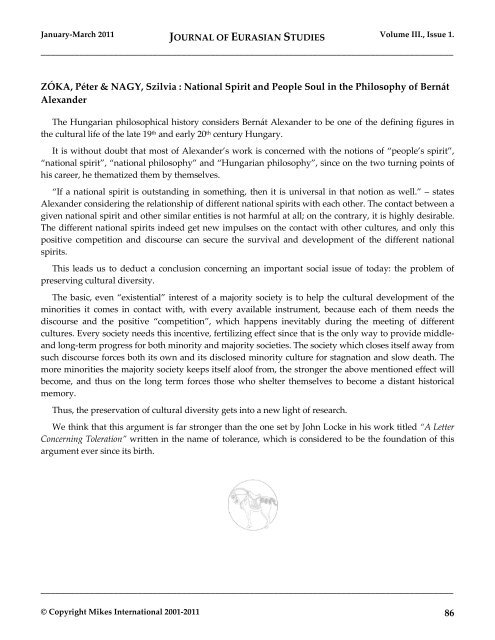JOURNAL OF EURASIAN STUDIES
JOURNAL OF EURASIAN STUDIES
JOURNAL OF EURASIAN STUDIES
You also want an ePaper? Increase the reach of your titles
YUMPU automatically turns print PDFs into web optimized ePapers that Google loves.
January-March 2011 <strong>JOURNAL</strong> <strong>OF</strong> <strong>EURASIAN</strong> <strong>STUDIES</strong> Volume III., Issue 1.<br />
_____________________________________________________________________________________<br />
ZÓKA, Péter & NAGY, Szilvia : National Spirit and People Soul in the Philosophy of Bernát<br />
Alexander<br />
The Hungarian philosophical history considers Bernát Alexander to be one of the defining figures in<br />
the cultural life of the late 19 th and early 20 th century Hungary.<br />
It is without doubt that most of Alexander’s work is concerned with the notions of “people’s spirit”,<br />
“national spirit”, “national philosophy” and “Hungarian philosophy”, since on the two turning points of<br />
his career, he thematized them by themselves.<br />
“If a national spirit is outstanding in something, then it is universal in that notion as well.” – states<br />
Alexander considering the relationship of different national spirits with each other. The contact between a<br />
given national spirit and other similar entities is not harmful at all; on the contrary, it is highly desirable.<br />
The different national spirits indeed get new impulses on the contact with other cultures, and only this<br />
positive competition and discourse can secure the survival and development of the different national<br />
spirits.<br />
This leads us to deduct a conclusion concerning an important social issue of today: the problem of<br />
preserving cultural diversity.<br />
The basic, even “existential” interest of a majority society is to help the cultural development of the<br />
minorities it comes in contact with, with every available instrument, because each of them needs the<br />
discourse and the positive “competition”, which happens inevitably during the meeting of different<br />
cultures. Every society needs this incentive, fertilizing effect since that is the only way to provide middle-<br />
and long-term progress for both minority and majority societies. The society which closes itself away from<br />
such discourse forces both its own and its disclosed minority culture for stagnation and slow death. The<br />
more minorities the majority society keeps itself aloof from, the stronger the above mentioned effect will<br />
become, and thus on the long term forces those who shelter themselves to become a distant historical<br />
memory.<br />
Thus, the preservation of cultural diversity gets into a new light of research.<br />
We think that this argument is far stronger than the one set by John Locke in his work titled “A Letter<br />
Concerning Toleration” written in the name of tolerance, which is considered to be the foundation of this<br />
argument ever since its birth.<br />
_____________________________________________________________________________________<br />
© Copyright Mikes International 2001-2011 86

















